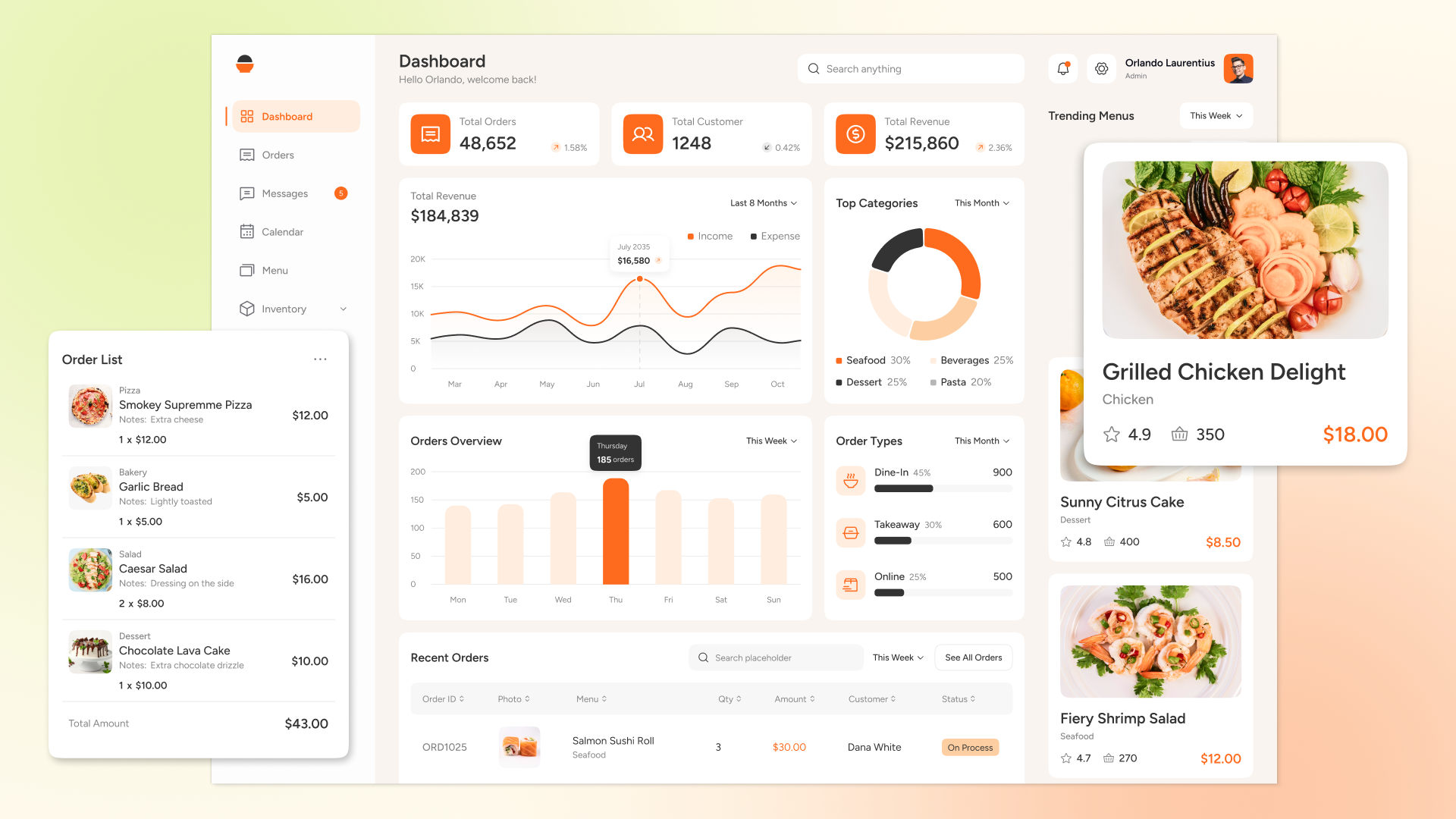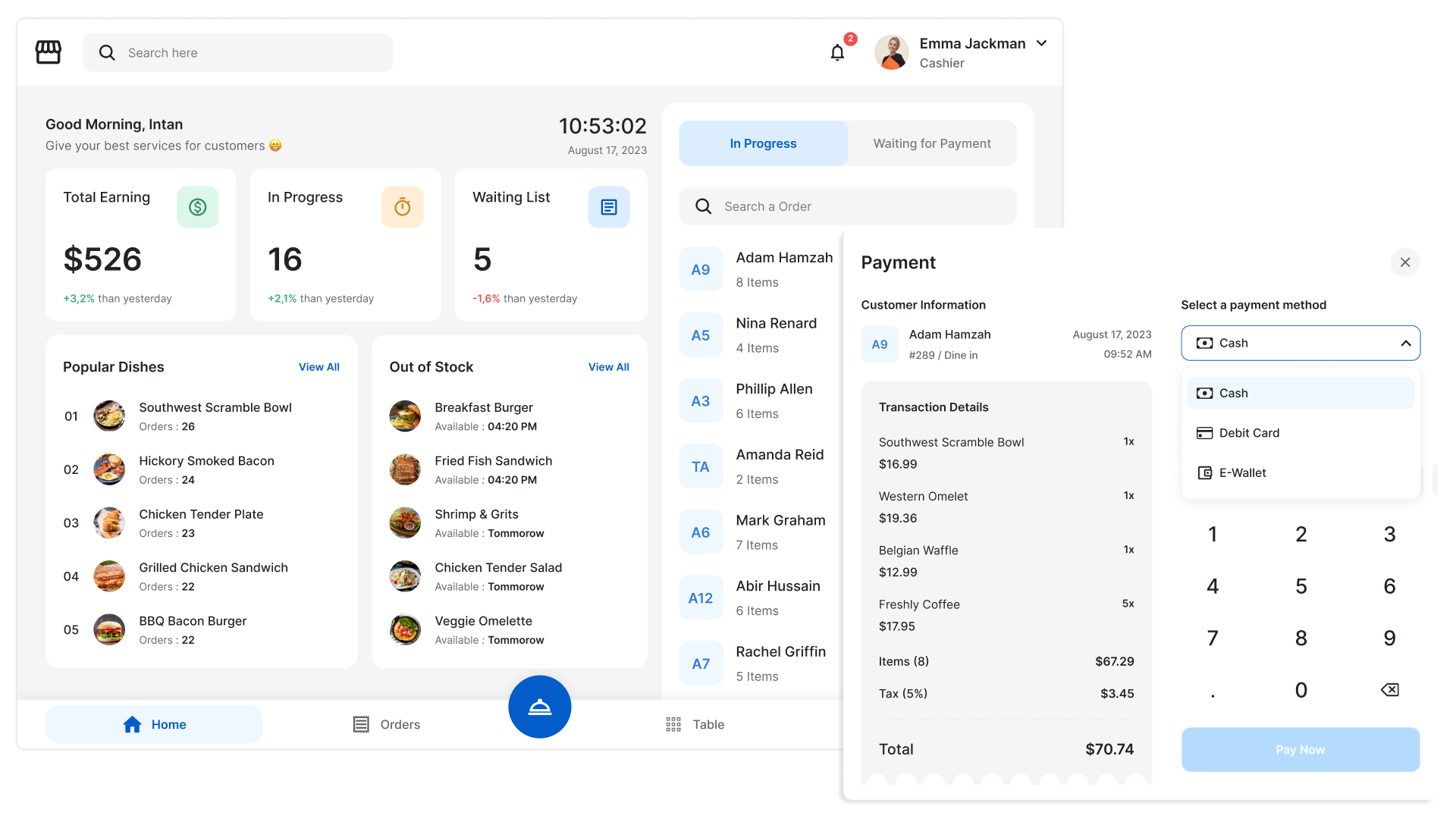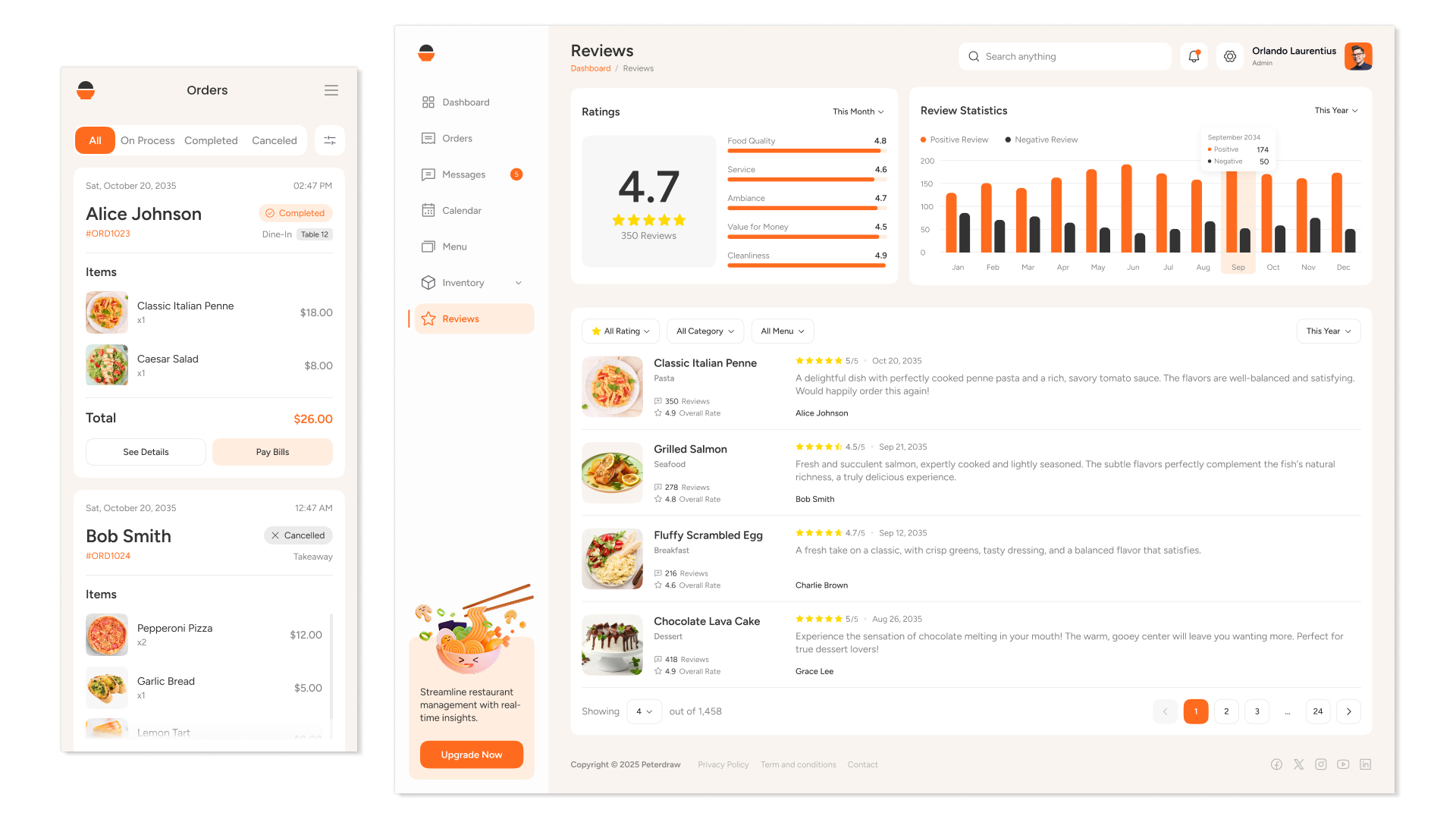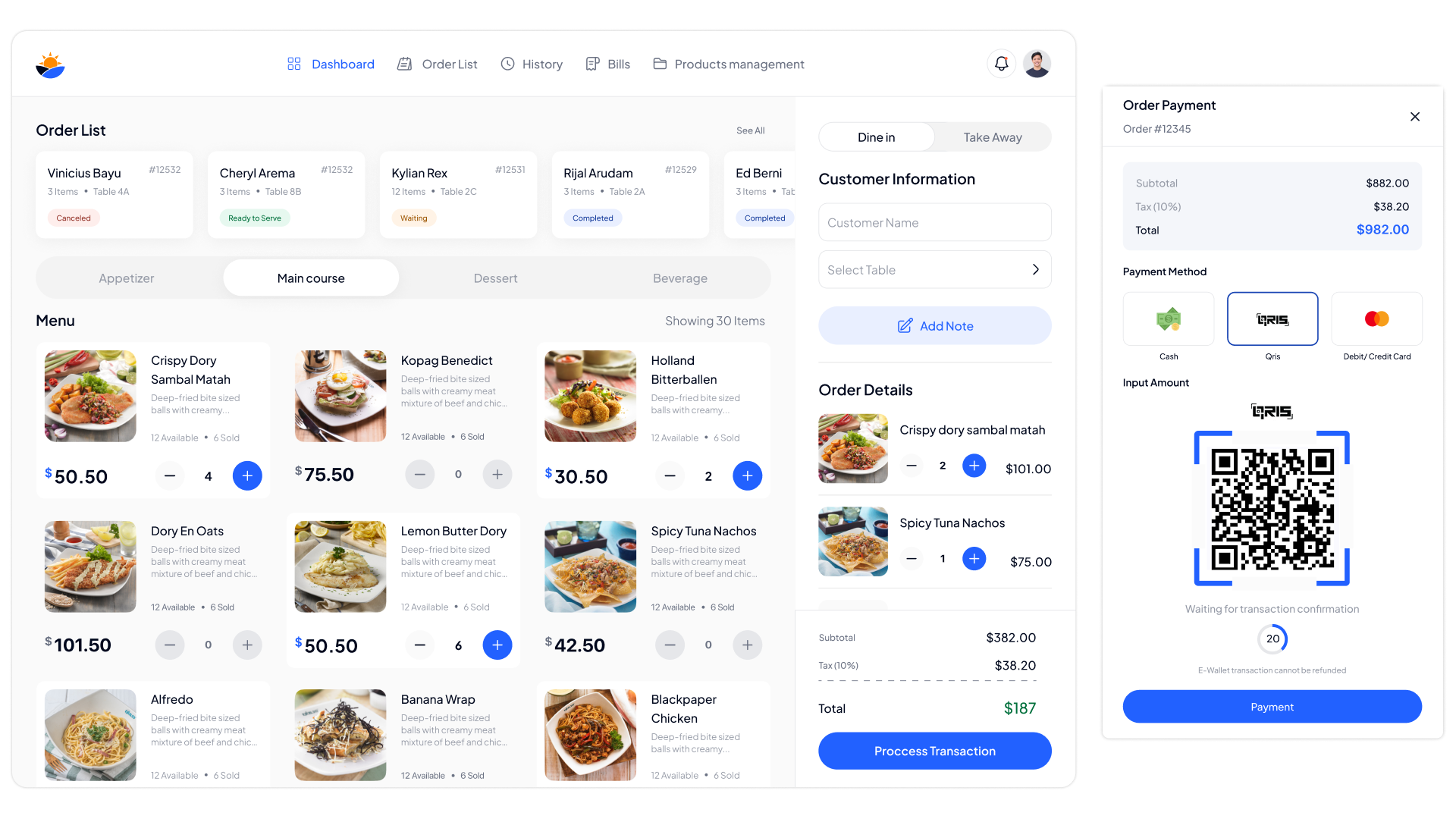
Modern conditions require from catering establishments a clear organization and effective management of the customer base. Restaurant automation software is the key to successful management. Implementation of a management system helps to minimize errors, optimize the work of staff, increase productivity and provide the best service for your visitors. Therefore, order CRM for restaurant is the best solution for those who seek not only to please regular guests, but also to attract new ones.
AVADA MEDIA offers CRM system development services for restaurants, cafes and food delivery services. We create flexible, scalable solutions that help bring your establishment to a new level of efficiency.
A CRM system for a restaurant is a software solution that automates and centralizes all the processes of an establishment: reservations, staff work, inventory control, sales analysis and customer interaction. It collects and analyzes data so that you can provide personalized service and build long-term relationships with your guests. It’s more than just a restaurant software program – it’s the brain center of the establishment that helps you reduce costs, increase customer loyalty and make informed strategic decisions.

In the catering industry, there are many complexities that arise every day that, without proper digital support, lead to service disruptions, financial losses and reduced service quality.
CRM for a restaurant is not just a digital assistant, but a real driver of business development. Its implementation opens up new opportunities for optimizing processes, improving the level of service and increasing profits.
Increasing customer loyalty
The system stores the history of orders, guest preferences and dates of visits. This allows you to create personalized offers – for example, a discount on your favorite dish on your birthday or a reminder about lunch. If a guest often orders a cappuccino with almond milk and a lactose-free dessert, the CRM system for cafes will automatically offer this combination in the mobile app or on the website. Such actions please customers and motivate them to come back again.
Process optimization
Automation of routine processes (booking, table allocation, order processing) allows staff to focus on service. Thanks to CRM, the administrator can see the current load of the room, waiters – their orders, and the manager – shift schedules. For example, when a waiter receives an alert on his tablet about a new reservation, the kitchen immediately prints an order for the corresponding number of dishes.
Improving the quality of service
The integration of a CRM program for a restaurant with online booking systems, mobile applications, and chatbots helps to ensure that customers have the most convenient interaction with the establishment. For example, a guest makes a reservation via Telegram-bot, immediately receives a confirmation and a personalized offer for dinner – and all this happens without the intervention of staff.
Fast delivery
CRM systems for restaurants help plan courier routes, can integrate with GPS navigation, process orders in real time and notify customers of delivery status. How it works: the courier receives the order on his smartphone, sees the route in Google Maps, and the customer receives a push notification of the shipment.
Increase profits
Reduced costs, more efficient warehouse management, targeted offers, automated upsell and cross-sell mechanisms allow restaurateurs not only to save money, but also to earn more. For example, the software analyzes pre-orders and offers the guest to add their favorite dessert to their order at a discounted price.
Transparent working conditions
CRM for coffee shop allows you to assign shifts, monitor productivity, minimize service errors, and automatically account for working hours. If your barista is constantly delaying the execution of orders, the program for coffee shops shows it in reports, so the manager can take timely action.
Single database and centralized management
Thanks to integration with other systems, the program turns into a single business management center, where all processes are synchronized and data is coordinated in real time. Warehouse records are automatically updated after each order, and the accounting department can see revenue reports immediately.
Reliable data protection
Protection of client data and internal business information is one of the priorities in the development of CRM-systems. For this purpose, reliable security features are implemented: data encryption, two-factor authentication, IP access control and backup protocols. Roles and access rights for different categories of users – waiters, administrators, managers, accountants – are set up separately so that everyone can see only the information he needs. That is, the cook sees only orders, the administrator – reservations, and the manager – full analytics.
Business Development Assistance
CRM can be adapted to the format of your business – from a small coffee shop to a chain of restaurants. If necessary, the cafe program can be scaled with the establishment. If you have a new establishment, the CRM is customized to its specifics, without the need to develop it from scratch.
Reasoned solutions
Interactive dashboards and analytical modules visualize key indicators: number of orders, popularity of dishes, staff load, effectiveness of marketing campaigns, average check, level of customer loyalty, etc. For example, with the help of CRM you can find out that hot drinks and dishes with delivery sell better on rainy days and adjust marketing. Clear graphs, heatmap-analysis of orders, traffic maps of attendance – all this helps to make quick and informed decisions without wasting time on manual processing of reports.
Multilingualism
A CRM system that supports several languages opens up new possibilities for servicing tourists, foreigners, multinational staff or franchise networks. In a custom management system, full localization of the interface is possible, including translation of menus, messages and newsletter templates. Waiters can choose the interface language (Ukrainian, English, Polish), and the customer will receive an electronic receipt in his language.
Flexibility and multi-format
The program can also be adapted to different business formats – from a food truck or cafe to a restaurant with several halls or a network of establishments with different concepts.
CRM for a restaurant
Customized development of CRM-system for a restaurant provides both basic and advanced functionality. This is a flexible designer that adapts to the needs of the institution, performing key functions that provide comprehensive automation of the restaurant.
Human Resources Management
The program for the restaurant automates many routine tasks: accounting for employee time, payroll, bonuses and sick leave, planning work schedules and vacations. CRM helps to evaluate staff productivity and communicate with the staff through an internal notification system.
Creating a customer database
The program for coffee shops and restaurants stores data about visitors: orders, frequency of visits, contact information, preferences, channels of interaction. It allows you to create separate groups of customers: new, regular, VIP and those who have not returned.
Management of production processes
CRM-system helps to manage technological charts of dishes, control their cost price, keep records of ingredients and food allergens. It also offers receipt printing for the kitchen and visualization of orders on kitchen screens (KDS).
Automated order taking and processing
CRM for the restaurant business allows you to process orders (in-room, take-out or delivery) from different channels – offline in the room, online on the website, via mobile app or messengers, via e-menu or QR ordering. Customers can browse menus and order from their smartphone, without a waiter.
Booking management
The management system helps to manage banquets and table reservations online or via chatbot, controls availability, takes into account customer requests (e.g. window, child’s chair).
Financial accounting and reporting
SRM for restaurant collects data and generates reports on sales (by dish, category, time, waiters, etc.), warehouse balances and goods movement, profit and expenses, staff productivity. Automates cash operations, income and expense accounting, controls debts of suppliers and customers.
Analytics
Restaurant software analyzes average check and number of guests, effectiveness of marketing campaigns and customer feedback. Allows you to segment customers for targeted campaigns and more personalized advertising.
Marketing and customer acquisition
Developing a CRM system for a restaurant allows you to implement loyalty programs (bonuses, discounts, personalized offers), manage promotions and special offers, maintain loyalty cards. Automates referral programs, email marketing and SMS mailings, surveys and collection of feedback from customers, integrates with social networks.
Warehouse and supply management
CRM system for restaurant records ingredient balances, automatically writes off products at each order and reminds about purchases. In addition to food, the restaurant program can keep track of napkins, packages, containers, cleaning supplies, etc.
Integration with other systems
A customized restaurant business management system seamlessly interacts with other elements of the digital infrastructure: POS terminals and accounting software (1C, SAP), ERP, online booking services, delivery services, courier applications, payment gateways, messengers (Telegram, Viber, WhatsApp) and social networks, accounting systems, online cash registers and fiscal registrars, electronic menu or QR-menu systems, aggregators, websites, mobile applications and order widgets.

Individual development of CRM-system for cafes and restaurants allows you to take into account the specifics of different formats of catering.
1. Restaurants with a full cycle of service thanks to CRM can:
2. Coffee shops with custom CRM have the ability to:
3. CRM allows fast food outlets to:
4. Confectionery, having CRM, can:
5. Other types of establishments (bars, pubs, canteens, buffets, food courts, etc.) get various useful options with CRM for restaurant business:
Individual development of CRM for cafes and restaurants with AVADA MEDIA allows each catering establishment to get the tools that best fit its business processes, target audience and development strategy.
Custom CRM functions
The use of bar and QR codes in the restaurant business has long since gone beyond warehouse accounting. In a custom CRM for restaurants, it is possible to implement a number of functions that increase the accuracy, speed and convenience of work of all departments of the establishment. However, barcodes and QR codes alone do not solve the problems of the restaurant. They may speed up operations, but without CRM they remain isolated functions. You scan the product, but you don’t see the analytics. You issue a dish, but don’t control costs. You do inventory but don’t know where margin disappears.
Only together with CRM coding turns into a powerful restaurant automation tool, where each scan is a part of the overall chain that connects the warehouse, kitchen, waiters, delivery and the owner. It’s not just accounting – it’s complete control over processes in real time. How it works:
QR menu for guests
A unique QR code is created for each table. The guest scans and opens the digital menu. The order is sent directly to the kitchen without the waiter’s involvement, and the guest receives a push or SMS confirmation. The current menu is updated with the CRM without the need to print new booklets.
Scanning of bonus cards, coupons and promotions
Each guest has a virtual bonus card with a barcode in his phone. When it is scanned, the system uses a discount, accumulates points or activates a promotion. Also in the CRM system for restaurants you can implement custom promo codes or personal QR coupons, which the program issues automatically after a certain number of visits.
Stock control
When each product or ingredient has its own barcode that is scanned when it is received, written off or moved, the risk of human error is reduced and you can see real-time balances. This is how you can scan product boxes, check lot consistency and shelf life. For inventory, simply walk around the lineup or refrigerators with a scanner (or a smartphone with a camera) – the CRM system will instantly generate a report on availability, expiration or discrepancies, and can also automatically calculate what dishes can be prepared from the current stock.
Control of finished products and ingredients
CRM for catering allows you to set the exact amount of each ingredient in one serving of a dish. When the waiter makes an order, the system automatically deducts the necessary amount of ingredients from the warehouse – exactly to the gram. For large establishments or production facilities (catering, fast food, chains), ready meals and semi-finished products can be labeled to track the batch, due date and responsible chef.
Optimizing logistics
In restaurants with delivery, each order has a unique barcode. The courier scans it upon delivery, and the system records the time, priority and route. You can implement a push for the customer: “Your order is on the way” or delivery confirmation. Convenient for dark kitchen, take away or delivery: everything is labeled, minimum confusion.
Employee authentication
Waiters, bartenders, cooks can authorize themselves in the system using a barcode or QR badge. This is faster than a password and more secure than shared accounts. The CRM will tie actions to a specific worker: who wrote off products, who generated an invoice, who delayed an order.
All scans (barcodes, QR) are recorded in the program: CRM-system for restaurants builds analytics on orders, shipments, dishes, staff. It helps to identify bottlenecks, delays or inefficiencies in the service chain.
In other words, barcodes without CRM is only a tool, but together it is a system. Individual development of CRM for coffee shops and restaurants allows to realize everything under the tasks of your institution – whether it is a restaurant with an open kitchen or a coffee shop with a takeaway window or a large fast food chain with delivery.

Automating your catering accounting is a tool for efficiency and growth. If the number of customers in your restaurant, coffee shop, bakery or food delivery service is growing rapidly, and you are already facing problems in order accounting, confusion in deliveries, low staff productivity or loss of customers – it is definitely time to order CRM for restaurant business. It will optimize processes, increase profits and ensure the competitiveness of your business.
Creating a CRM system for restaurant business takes several stages and requires certain tools, technologies and a team of professionals with experience in automating catering establishments.
Development of CRM for coffee shops, pizzerias, restaurants, fast food establishments begins with the study of details, in particular, the peculiarities of the kitchen, hall, delivery, as well as interaction with suppliers. Next, the existing management systems, weaknesses and needs of the establishment are identified to outline the functions of the system.
Based on the analysis, a detailed specification is developed describing all functional and non-functional requirements for the program, integration with reservation and delivery systems, and loyalty programs. The specification includes a project plan taking into account key factors and needs – such as seasonality, peak hours, need for fast order processing, etc.
At this stage they develop a database architecture that allows to efficiently store and process information about customers, orders, menus, delivery. Using modern tools (Moqups, Figma, Adobe XD, Sketch, Balsamiq) create interactive prototypes of the interface, reflecting the convenience of booking tables, speed of ordering, ease of navigation through the menu. It is important to take into account the peculiarities of staff work, in particular, quick access to information about customers and the ability to take orders on different devices. Thanks to interactive mockups, the customer can test the system even before development and make adjustments to the project.
Design of CRM-system for a restaurant should correspond to the visual identity of the brand, reflect the atmosphere of the institution, emphasize its style and menu features. It is important to create an adaptive design for convenient use of the application on any device, from tablets of waiters to smartphones of couriers.
UI-designers create visual elements that help the staff to quickly find the necessary information – for example, color codes for different types of orders, icons to indicate the delivery status. They use such tools as Figma, Adobe Photoshop, Illustrator, After Effects.
This is a key stage of development, where programmers write code for the frontend and backend parts of the project, using programming languages, modern frameworks and libraries (React, Angular, Vue.js), ensuring high performance and reliability of the system. In addition to the implementation of functionality, programmers set up the necessary integrations – with booking systems, POS-systems, delivery services, IP-telephony, to ensure smooth operation of all processes. Cloud platforms such as AWS, Google Cloud, Azure are used to ensure scalability and availability of the system.
A responsible stage dedicated to comprehensive testing of functionality, integrations, security, in particular in conditions of significant loads. It is important to test the system in the real working conditions of the institution to ensure that it meets the needs of staff and customers, as well as on different devices and browsers to ensure correct operation on all platforms.
After successful testing, the program is gradually put into operation. A mandatory stage is staff training and constant monitoring of the CRM to promptly respond to any problems.
Post-implementation support of CPM for restaurant involves solving problems with program operation, assisting users, and updating the program – adding new features and improving existing ones to ensure that the system always meets the changing needs of your business. The data and feedback received from users about the implemented management system is used to identify opportunities for optimization and improvement.
On the market there are many ready-made CRM solutions for automation of a coffee shop, pizzeria or restaurant, but in most cases they do not meet the real needs of a particular institution for a number of reasons.
A CRM system for a restaurant is a modern tool that can change your business for the better, making it more profitable, more manageable and customer-oriented. With an automated management system every customer receives personalized service, orders are processed instantly, and food delivery always arrives on time – with an efficient custom management system it is real. AVADA MEDIA will help you develop software that will turn your restaurant into a benchmark of efficiency and customer focus.
We provide dedicated teams of specialists experienced in CRM development for cafes and restaurants. They know how to optimize business processes through automation so you can focus on what matters most – creating the best gastronomic experience for your customers.
How much money and time does it take to develop a management system for a restaurant?
Depending on the complexity of the project, from several months to six months and more takes a full automation of the restaurant, the price also depends on the functionality, duration of development, tools and specialists involved.
Is it possible to manage the establishment remotely in CRM?
Yes, the program allows you to monitor sales, staff work and orders through a web interface or mobile application.
What features does the CRM system for restaurant food delivery include?
Depending on your business needs, you can customize CPM for food delivery by implementing features such as takeaway order management, courier control, integration with websites and mobile apps, and delivery tracking system.
Is a CRM system suitable for a coffee shop?
You can develop a CRM for coffee shops to manage orders, loyalty programs and partially automate the work of baristas.
How does CRM improve food delivery?
CRM for food delivery service allows you to automate the receipt of orders, optimize the routes of couriers and track the delivery status in real time.
Can a CRM be used for pizza delivery?
You can develop a program ideally suited for pizzerias that automates order taking, courier management and sales analytics.
Can CRM for bakery be integrated with production processes?
Yes, bakery software allows you to automate production processes, track ingredient costs and optimize sales.
Do I need to order a separate CRM for food delivery?
It depends on your business. If delivery is your core business, it’s worth ordering a specialized CRM that optimizes courier routes, integrates with delivery services, and automates order management. If delivery is an additional service, you can integrate it into a general CRM for the restaurant.
Our works
Contact the experts Have a question?
Developed by AVADA-MEDIA™
The user, filling out an application on the website https://avada-media.ua/ (hereinafter referred to as the Site), agrees to the terms of this Consent for the processing of personal data (hereinafter referred to as the Consent) in accordance with the Law of Ukraine “On the collection of personal data”. Acceptance of the offer of the Consent is the sending of an application from the Site or an order from the Operator by telephone of the Site.
The user gives his consent to the processing of his personal data with the following conditions:
1. This Consent is given to the processing of personal data both without and using automation tools.
2. Consent applies to the following information: name, phone, email.
3. Consent to the processing of personal data is given in order to provide the User with an answer to the application, further conclude and fulfill obligations under the contracts, provide customer support, inform about services that, in the opinion of the Operator, may be of interest to the User, conduct surveys and market research.
4. The User grants the Operator the right to carry out the following actions (operations) with personal data: collection, recording, systematization, accumulation, storage, clarification (updating, changing), use, depersonalization, blocking, deletion and destruction, transfer to third parties, with the consent of the subject of personal data and compliance with measures to protect personal data from unauthorized access.
5. Personal data is processed by the Operator until all necessary procedures are completed. Also, processing can be stopped at the request of the User by e-mail: info@avada-media.com.ua
6. The User confirms that by giving Consent, he acts freely, by his will and in his interest.
7. This Consent is valid indefinitely until the termination of the processing of personal data for the reasons specified in clause 5 of this document.
Send CV
Contact us in any convenient way for you:
+ 38 (097) 036 29 32